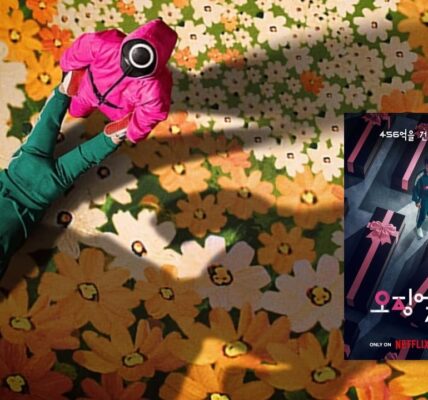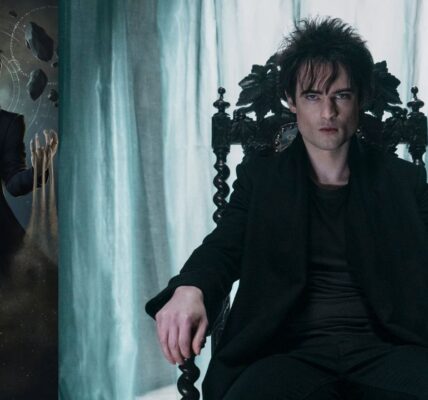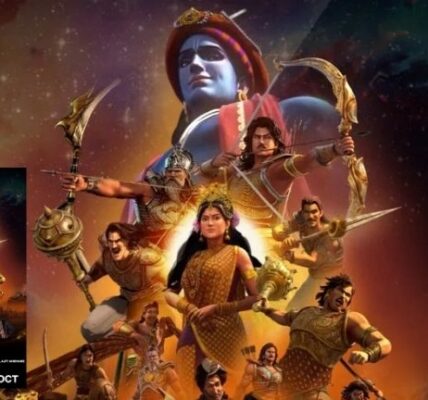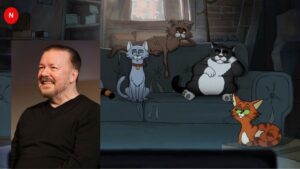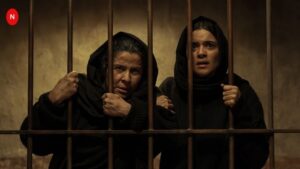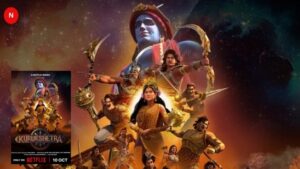‘Our Times’ Netflix Movie Review
What if the biggest challenge in your marriage wasn’t infidelity or miscommunication—but the future itself?
Netflix’s new Spanish-language film Our Times (Nuestros tiempos), directed by Mariana Chenillo, is a time-travel romantic comedy with a surprising amount of heart. Set against the backdrop of both 1966 and 2025 Mexico, this story gracefully explores love, ambition, and gender roles through the lens of science—and a bit of science fiction.
The film introduces us to Dr. Nora Cervantes (played wonderfully by Lucero) and her husband, Dr. Héctor Esquivel (Benny Ibarra). In 1966, they’re brilliant physicists—equal in intellect, but not in opportunity. While Héctor is celebrated, Nora is sidelined, her genius largely ignored because of her gender.
But everything changes when the couple accidentally sends themselves 60 years into the future. Suddenly, they land in modern-day Mexico City, where women lead science labs, gender equality is (mostly) mainstream, and their outdated 1960s views are hilariously out of place.
For Nora, the future is a dream—she thrives in a world that finally values her mind and independence. But for Héctor, it’s disorienting and emasculating. As she rises, he retreats. Their marriage, once defined by shared dreams, begins to buckle under the weight of cultural evolution and personal rediscovery.
Themes That Resonate
At its core, Our Times is about growth—both personal and relational. It’s a story of feminism, not in a preachy sense, but in a human one: a woman stepping into her full potential, and a man struggling to keep pace.
The movie cleverly uses time travel not just as a plot device, but as social commentary. The contrast between 1960s conservatism and 2025’s progressive norms offers comedic moments—think Nora navigating a smart home with AI—but also raises thoughtful questions about gender, ego, and who gets to thrive when society changes.
Performance Highlights
Lucero is the standout here. Her portrayal of Nora is vibrant, grounded, and inspiring. You believe her joy as she explores the 21st century—not just as a woman liberated from sexism, but as a scientist finally seen.
Benny Ibarra plays Héctor with a mix of confusion and quiet heartbreak. While his arc is thinner than Nora’s, he does manage to convey the internal chaos of a man watching the world—and his partner—outgrow him.
Tone & Style
Our Times strikes a charming balance between romantic comedy and science fiction light. Don’t expect intricate time loops or technical jargon—the film is far more interested in emotional journeys than theoretical ones.
With warm cinematography and a tight 90-minute runtime, the movie moves briskly. At times, maybe too briskly—some character developments, especially Héctor’s, feel undercooked. But the film’s sincerity and sense of humor more than make up for it.
The Verdict
Stream it. Our Times may not revolutionize the time-travel genre, but it offers something many films in the space forget: emotional evolution. It’s less about paradoxes and more about possibilities—especially for women who’ve been waiting decades to be heard.
It’s funny, feminist, and full of heart. Whether you’re a sci-fi lover, a rom-com fan, or just someone curious about how far we’ve come (and how far we still have to go), Our Times is worth the watch.
Main Cast
Lucero plays Dr. Nora Cervantes, a trailblazing physicist from 1966 who finds herself flourishing in the modern world of 2025, where her brilliance is finally recognized.
Benny Ibarra stars as Dr. Héctor Esquivel, Nora’s husband and scientific partner, who struggles to adjust to a future where traditional gender roles have shifted dramatically.
Supporting Cast
Renata Vaca portrays Alondra, Nora’s inquisitive grandniece in the year 2025. A young physicist herself, she helps Nora embrace her newfound freedom and potential.
Ofelia Medina takes on the role of Julia (2025), once Nora’s student and now the dean of a prestigious university. She offers crucial support as the couple adapts to modern society.
Carolina Villamil appears as Julia (1966), showing us the character’s origins during Nora’s earlier life, adding emotional depth to their shared history.
Claudia Lobo features in a smaller, yet meaningful role, although her character’s details remain less defined in promotional materials.
Creative Team
Director: Chava Cartas (credited in some sources alongside Mariana Chenillo), brings a soft, humanistic lens to the time-travel genre with a focus on relationships and identity.
Writers: Juan Carlos Garzón and Angélica Gudiño craft a clever and emotional script that bridges eras and generations with wit and insight.
Composer: Víctor Hernández Stumpfhauser provides a score that blends nostalgic tones with contemporary rhythms, reinforcing the film’s time-bending atmosphere.
Character Dynamics at a Glance
Nora is energized by a future where her intelligence is valued, igniting a personal and professional rebirth.
Héctor faces an identity crisis, no longer the dominant voice in science—or in his marriage—as society’s values evolve around him.
Alondra acts as a modern-day mentor and guide, encouraging Nora to let go of the past and embrace progress.
Julia, in both timelines, represents the enduring impact of mentorship and the passage of knowledge between generations.
Read More:-
What’s Coming to Netflix in June 2025: Movies, TV, Original Series
